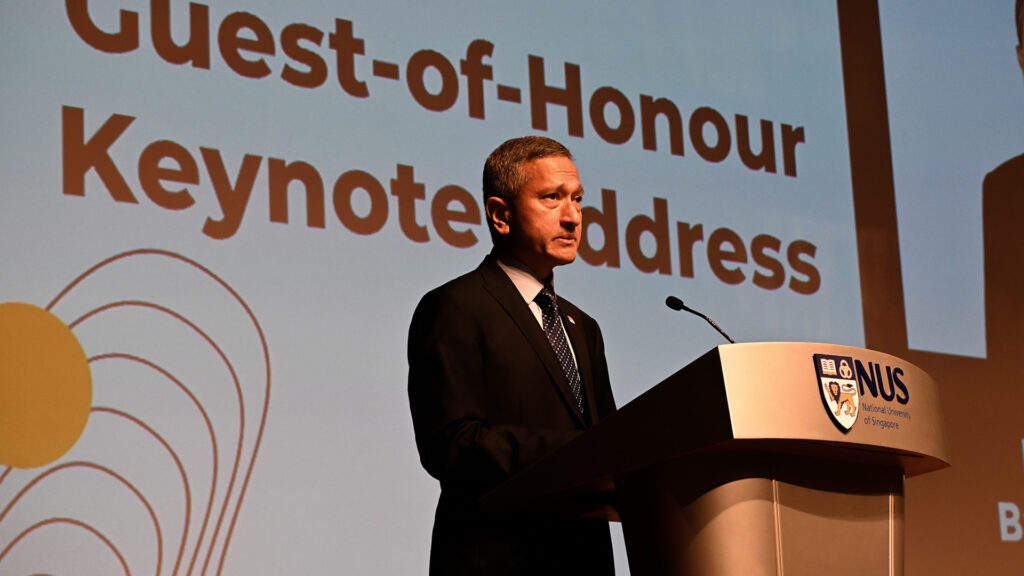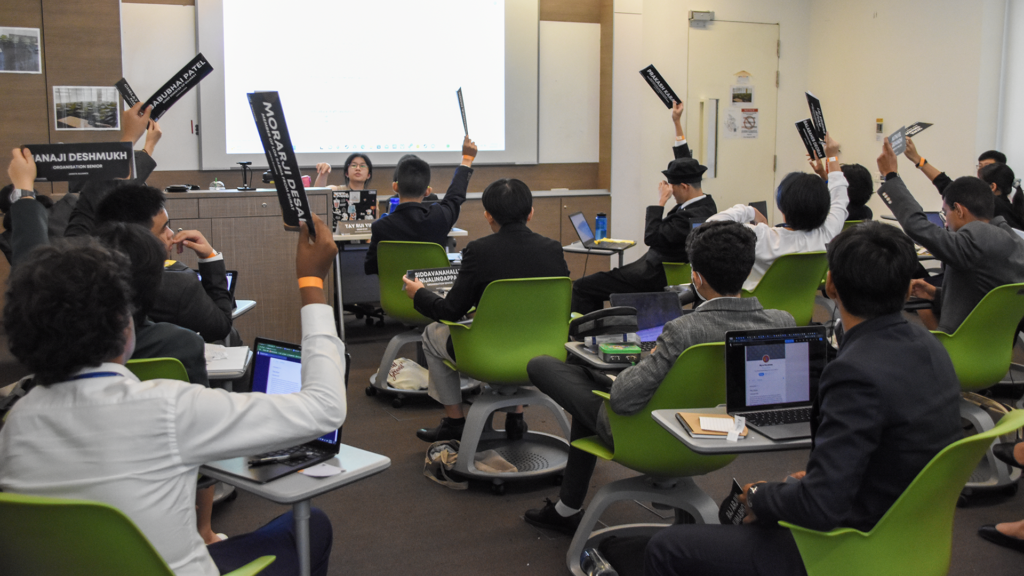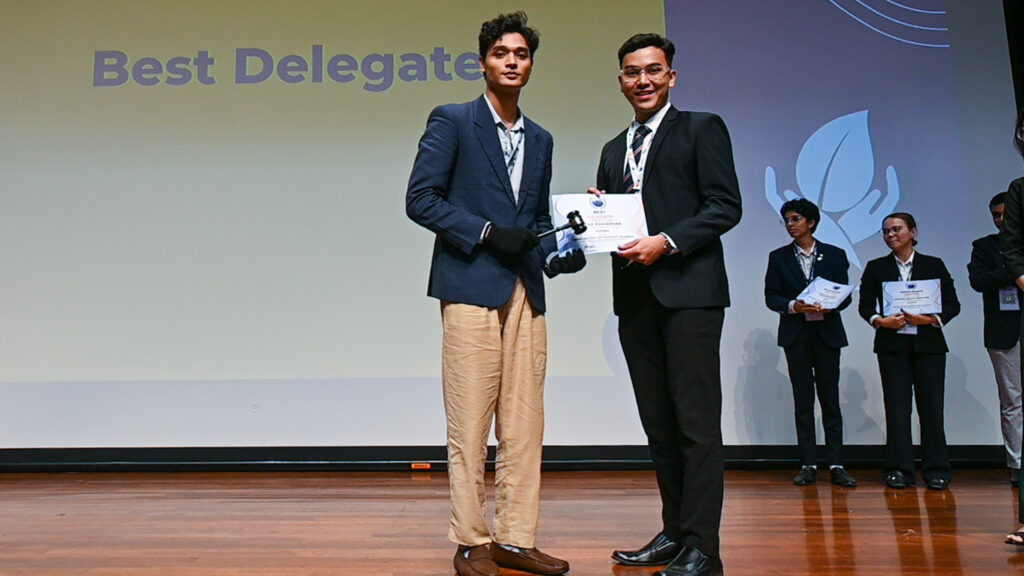NUS Political Science Society Hosts 400 Students from the Region at 20th Anniversary of Singapore Model United Nations
July 14, 2023
IN BRIEF | 5 min read
- About 400 students from more than 20 secondary schools, pre-university and tertiary institutions in Singapore and the Asia-Pacific region gathered to debate pressing global developments and issues such as healthcare, climate change and peacekeeping at the 20th Singapore Model United Nations (SMUN) conference.

About 400 students from more than 20 secondary schools, pre-university and tertiary institutions in Singapore and the Asia-Pacific region gathered to debate pressing global developments and issues such as healthcare, climate change and peacekeeping at the 20th Singapore Model United Nations (SMUN) conference.
Organised by the NUS Political Science Society (NUSPSSOC) from 6 to 9 June at NUS University Town, the turnout is the highest in the event’s history.
Themed “20 Years of Diplomacy and Empowerment”, the flagship NUSPSSOC event saw students taking on the roles of UN delegates and councils such as the United Nations Security Council and international organisations like the North Atlantic Treaty Organization and the World Health Assembly to engage in intense discussions and negotiations on the most challenging problems facing the world today.
Guided by the theme, Dr Vivian Balakrishnan, Singapore’s Minister for Foreign Affairs delivered a keynote speech about the “storm clouds” looming over Singapore – the Russia-Ukraine conflict, competition between the US and China and the upsurge of anti-globalisation sentiments.
Singapore is a diverse and small country that is highly dependent on trade. To survive in such headwinds, Dr Balakrishnan said Singapore should continue to uphold a rules-based international order, strengthen multilateral cooperation and make more friends.
Stressing the importance of unity in facing these challenges, he commented, “Foreign policy begins at home…If Singapore was not united, cohesive, successful, relevant, useful and constructive, nobody would care.”
Dr Balakrishnan also spoke about the need to harness opportunities brought about by new technologies including digital technology and renewable energy. To illustrate the potential of digital technology, he used artificial intelligence software such as Perplexity AI and ChatGPT onstage to seek their views on the topics that were in discussion.

An enriching exchange of views
The SMUN conference is a simulation of the meetings that United Nations members often have, and saw students participating as delegates in 11 intense councils debating 22 topics.
Participating students, known as “delegates” work as representatives of a council to solve a problem with fellow delegates. They conduct research, formulate position papers and create policy proposals that they will debate with other delegates in their council. At the end of the event, delegates will vote on draft resolutions, with the goal of passing them with a majority vote. The best performing delegates in each council will be recognised with awards.
Standout sessions over the four-day period included one that focused on the European Commission’s 2030 Climate Plan to cut greenhouse emissions in Europe by at least 55 per cent by 2030 and examined EU countries’ historical responsibility to climate change. Delegates reviewed existing policies and proposed creative solutions to resolve the region’s climate issues.
Another interesting council session was by the World Health Assembly which focused on the protection of healthcare workers. COVID-19 had highlighted their plight as many healthcare workers face the increased risk of virus exposure, burnout from long work hours, as well as discrimination and abuse from the public. The council discussed safeguards and necessary measures to ensure their physical safety and mental well-being.
At the end of the debates, local and international delegates were treated to dinner and music at the Singapore Flyer with a view of the scenic Marina Bay.

A unique learning experience for delegates
The conference’s closing ceremony on the fourth day provided delegates with the opportunity to meet with Mr David Chua, Chief Executive Officer (CEO) of the National Youth Council, and Ms Ivy Tse, CEO of non-profit youth organisation – the Halogen Foundation – who spoke at a short panel discussion on youth empowerment. Mr Chua and Ms Tse focused on the ways in which youths can help the less fortunate around the world and how the UN can serve as a bridge between developed and developing countries to do so.
Awards were also given out to delegates to commend them on their efforts and achievements across categories such as Best Delegate, Outstanding Delegate, Honourable Mentions and Best Position Paper.
Mr Raka Ramadhan from Universitas Indonesia, received the Best Delegate award and the prized gavel for his standout contributions in the United Nations Environment Agency council.
Commenting on his experience, Raka shared that he initially thought determined diplomacy and eloquent speeches were the key factors to being the best delegate. However, the heated and rigorous debates while role-playing a country within a council made for an intense experience which gave him fresh perspectives. The friendships forged and bonds made despite the intense discussions also made it very memorable.

SMUN Secretary General and Year 2 FASS-Political Science student Zahid Zailani shared how the SMUN conference presented a unique opportunity for students to hone their critical thinking and public-speaking skills, as well as cultivate nuanced perspectives and deep empathy for global issues. “Ultimately, the sessions reveal that world events have reverberating impacts. We all bear a shared responsibility to create solutions to global problems.”
This story by the NUS Political Science Society at FASS first appeared in NUSnews on 14 July 2023.

